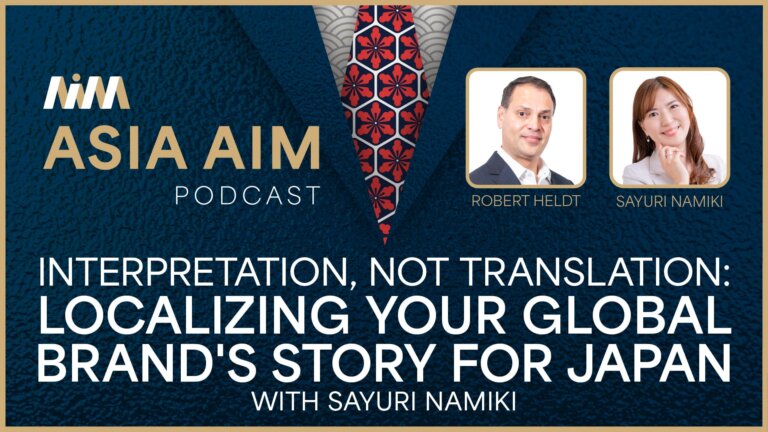- Podcast
・ September 18, 2025
Episode 3 – The Unwritten Rules of B2B Sales in Japan: Relationships First
During the third episode of the Asia Aim podcast, AIM B2B CEO Robert Heldt and Dr. Greg Story, President of Dale Carnegie Training Japan, uncover the critical aspects of B2B sales success in the Japanese market. Dr. Story has over 40 years of experience in Japan and is the author of Japan Sales Mastery.
He shares his pivotal insights after learning that his Western consultative sales techniques were not effective with Japanese buyers. He explains how Japanese buyers look at the salesperson, not just the offer, which became the foundation of his successful career.
This article will help you navigate the complexities of consensus-driven decision-making in Japan, providing essential insights into concepts like kokorogamae (true intention) and nemawashi (groundwork).
Why are relationships and trust so crucial for B2B sales in Japan?
In Japan, trust is the most crucial part of B2B sales. The Japanese market is highly risk-averse, and buyers prioritize a salesperson they can trust over the immediate offer. For this reason, it is essential to build a trusting relationship before the transaction. Dr. Story realized that building a relationship first was the key to his success, as his Australian sales techniques yielded “zero progress” with Japanese buyers.
What are kokorogamae and nemawashi, and why are they essential?
Kokorogamae is about demonstrating your true intention and showing that you are invested in the client’s long-term success. It’s a key part of a strong sales strategy in Japan.
Nemawashi is the process of laying the groundwork or building consensus. These concepts are crucial because Japanese decision-making is consensus-driven, meaning that a formal proposal comes only after all key stakeholders have been consulted and have agreed. Mastering both is vital for every deal.
How can you earn a Japanese buyer’s trust?
To earn a buyer’s trust, you must demonstrate diligence and reliability. Providing detailed materials and speedy replies are essential to address the due diligence process and build confidence with Japanese buyers. This shows that you are prepared and respect them.
How should you approach the slow, consensus-driven sales cycle?
Patience is critical during the slow, consensus-driven decision-making process. While the upfront process may seem lengthy, once trust is established and a decision is made, the execution is very fast. The ultimate goal is to solidify a long-term partnership, which requires patience from the outset.
Frequently Asked Questions (FAQ)
Q: Is it challenging to get testimonials or referrals in Japan?
A: Yes, it can be a challenge. A common strategy to overcome this is to focus on strengthening the long-term partnership with your client, which can lead to reorders and a natural, positive reputation over time.
Q: What is the biggest mistake foreign companies make in their Japan sales strategy?
A: A common mistake is to focus only on the offer, rather than prioritizing a relationship-first mindset. Without building trust and demonstrating a long-term commitment, foreign companies often struggle to make progress in the Japanese market.
Conclusion: The Path to Success in Japan
Mastering B2B sales in Japan requires more than a great offer. It demands a relationship-first mindset built on patience, trust, and a deep understanding of cultural practices like kokorogamae and nemawashi.
Listen to the full episode of the Asia Aim podcast to hear Dr. Story’s personal anecdotes and proven strategies for mastering the Japanese market.
Share
Listen to This Episode
Author
Category
- Strategy
- Branding
- PR & Communication





